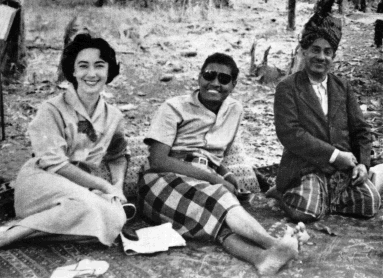| The British-Yemeni Society |

|
Obituary
June Knox-Mawer (1930–2006) June Knox-Mawer’s death at the age of 75 ended a distinguished career in radio broadcasting, notably as a presenter of Woman’s Hour on the BBC. But before that, after a spell as a journalist in Chester, she had spent some 6 years in Aden, followed by 11 years in Fiji, as the wife of a member of the Colonial Legal Service. Her husband Ronald Knox-Mawer, a barrister, was posted to Aden as Chief Magistrate in 1952, some six months after their marriage. Just before she left England the Daily Express took her on as their Aden stringer. She was then aged 21. The normal tour for expatriates in Aden was 13 months, followed by nearly 6 months of leave, and her husband would become Acting Chief Justice while the substantive judge was himself on leave. This meant that, despite her youth, she had to be a decorous grande dame in Colony society for much of her time. She wrote entertainingly of this in her memoir ‘The Sultans Came to Tea’, published in 1961. She brought a spirited zestfulness to the restrictions of Colony life; some may remember her as an alluring Queen of Sheba in a fancy-dress parade round the swimming pool of an RAF officers’ club, with a cohort of retainers and riding a caparisoned camel (until it fell in).
The Aden judiciary had no function in the Aden Protectorate, which was closed to expatriates in the Colony, there being no roads, hotels or adequate security. But June Knox-Mawer was keen to meet Arab chiefs, entertaining a young girl’s romantic fancy of being ‘ushered into a black goats hair tent by a bearded Valentino’. Her first such contact was the young and recently knighted Sultan of Lahej, Sir Ali bin Abdul Karim, the senior and most sophisticated of the Western Protectorate chiefs, whose Sultanate abutted the Colony. He commuted to Lahej from his palace in Crater (where June visited his wife in the harim), attended Aden parties, played tennis weekly with her husband and took them to different parts of Lahej on picnics. But Sultan Ali was an admirer of Colonel Nasser’s brand of Arab nationalism, sponsoring a political party in Aden, the South Arabian League, under his close friend Sayyid Muhammad al-Jifri, which called for the British to leave Aden and for the Colony and the Western Protectorate to become a unified state under Sultan Ali’s control. This was a notion abhorrent to other Protectorate rulers. When al-Jifri was banned from Aden and took refuge in Lahej, the Knox-Mawers were taken to see him there on one of their visits. This basically social friendship with the Sultan and his henchmen, together with June Knox-Mawer’s liberal-minded though no doubt well-intended cables to the Daily Express following social meetings with others in Aden involved in the political scene, was embarrassing to the Governor of Aden, then trying to negotiate a federal constitution for the Protectorate which the chiefs could support. Shortly after the Knox-Mawers left Aden Sultan Ali absconded to Cairo and was deposed. Through Sultan Ali, June Knox-Mawer also met Sultan Saleh bin Hussayn, the Audhali Sultan, though communication was restricted by his lack of English and hers of Arabic. He invited her to visit Mukeiras, bordering Yemen on the high plateau, then being developed as a source of fruit and vegetables and as a potential hill station. Aden Airways had started to run a weekly Dakota service there, their first into the Protectorate, which enabled the young Sultan to visit Aden easily and join in its social scene. June Knox-Mawer spent a fortnight there, with a chaperone, as the Sultan’s guest, giving her a taste of the up-country Arabia she so keenly sought, although she was disappointed to find other Europeans already there – a small group of officers of the Cameron Highlanders. Outside of Lahej this was her only trip into the Protectorate. June Knox-Mawer’s time in Aden clearly made a deep impression on her and she wrote about it with enthusiasm and fluency, especially in ‘The Sultans Came to Tea’. Students of ‘the end of empire’ in South Arabia will probably find her sympathetic portrayal of Sultan Ali a valuable counterweight to British officialdom’s somewhat negative view of him at the time. In the 1980s, by then a well-known voice on the BBC, she presented ‘Tales of Araby’, a series of interviews with people some of whom she had known in Aden. These included a memorable description by Heather Seager of the nearly successful attempt by a religious fanatic to assassinate her husband, Basil Seager, the British Agent for the Western Protectorate, while they were spending Christmas 1951 together in Dhala. Also included were interviews with Lady Champion (wife of a Governor of Aden), Major-General James Lunt (who had published his own memoirs of his time in Aden), and Muhammed Farid, a former Political Officer who became Foreign Minister for the Federal Government. She also wrote several books derived from her experiences in the South Seas. In 1991 she published a novel, ‘Sandstorm’, a romantic account, in a pre-First World War setting, of a girl married to a repulsive Deputy Political Resident in Aden who found consolation and steamy love with an Arab prince. This clearly drew heavily on her own Aden experiences; the prince, who much resembled Sultan Ali, was ‘The Emir of Jehal’, which is but ‘Lahej’ reversed. It won the Boots Romantic Book of the Year prize for 1992. Nigel Groom |
